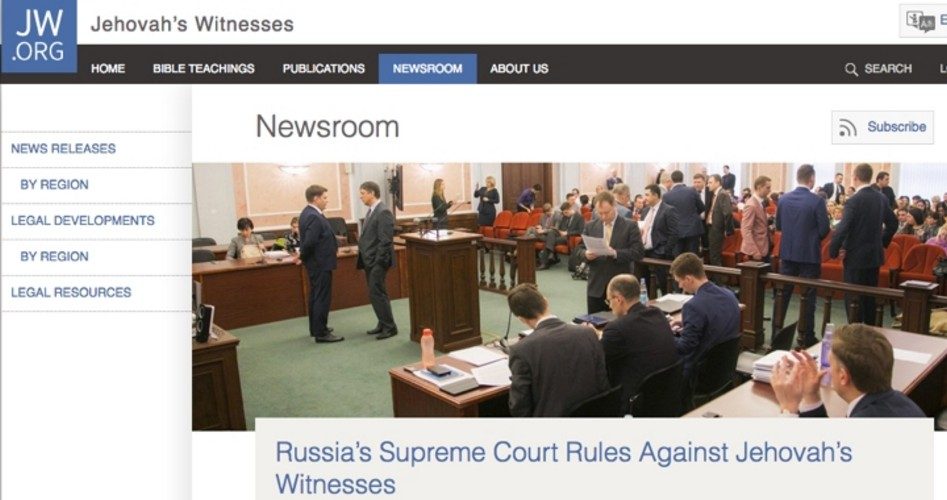
Under the guise of battling “extremism,” Russian authorities decided last month to ban the Jehovah’s Witnesses religious organization. The decision to prohibit the organization, seize its property, and shut down its operations came in the form of a Supreme Court ruling upholding a request from the Russian Ministry of Justice. The estimated 170,000 Russian adherents are forbidden from meeting or worshiping, and could risk jail for doing so. Some of the group’s literature and publications were already banned in Russia as “extremist,” and now, all of it is. The move follows similar attacks on religious freedom by Russian authorities aimed at evangelical Christians and other Christian denominations.
According to the Interfax news service, Russian Justice Ministry attorney Svetlana Borisova told the Russian Supreme Court that the Jehovah’s Witnesses “pose a threat to the rights of the citizens, public order and public security.” Among other concerns, Borisova noted that the group’s religious-based opposition to blood transfusions was a violation of Russia’s healthcare laws. The state also claimed that the Jehovah’s Witnesses were violating a 2002 Russian law banning “extremism,” a statute that has been weaponized and abused to harass multiple religious groups, particularly Christian organizations and denominations not affiliated with the Russian state.
The Supreme Court agreed with the Justice Ministry that the Jehovah’s Witnesses were extreme, and therefore upheld the ban on April 20. Under the verdict, Judge Yury Ivanenko ordered the disbanding of all 400 local branches of the group, as well as the confiscation of their property by the government. The court cited a wide array of publications and documents — some of which the organization claimed were planted by authorities — in justifying the ban and asset forfeiture. The ruling makes all religious activity by adherents of the organization, which prosecutors described as a “sect” and a “cult,” illegal and punishable as “extremism” under criminal law. An effort days later seeking to have the order declared illegal was denied.
In a statement after the ruling, Jehovah’s Witnesses spokesman Yaroslav Sivulsky blasted the ruling. “We are greatly disappointed by this development and deeply concerned about how this will affect our religious activity,” he said, adding that the group, which shuns politics and violence, planned to appeal the decision, potentially to an international tribunal. On the Jehovah’s Witnesses website, which was also declared to be illegal extremism, the group warned that the ruling would also lead “to grim consequences to the adherents of different denominations,” as well as potentially damaging “Russia’s international image.”
Foreign governments, the European Union, and non-governmental organizations also rushed to decry the controversial ban. “The supreme court’s ruling to shut down the Jehovah’s Witnesses in Russia is a terrible blow to freedom of religion and association in Russia,” argued Rachel Denber, deputy Europe and Central Asia director for the group Human Rights Watch. The EU’s “European External Action Service” put out a statement slamming the ban as well, pointing to Russia’s Constitution and to “Russia’s international commitments and international human rights standards.” Numerous governments issued condemnations of the action, too.
While reports of President Trump speaking out were reportedly false, the Trump administration’s State Department did release a statement condemning the ruling. “The United States is extremely concerned by the Russian government’s actions targeting and repressing members of religious minorities, including Jehovah’s Witnesses, under the pretense of combating extremism,” said State Department spokesman Mark Toner, adding that Russian authorities should not misuse legislation on terror and extremism to target “peaceful religious minorities.” He, too, pointed to Russia’s Constitution and said that freedom of religion is not only guaranteed, but “critical” to peaceful and stable societies.
One organization that celebrated the ruling was the Russian Orthodox Church, which said the Supreme Court made the right decision and that the ban would protect families. “This will save families and people’s lives and I think a (court) ruling of this kind is only welcome,” declared Metropolitan Ilarion, the head of Moscow Patriarchate’s Department for External Church Relations. Conceding that the ruling would not be able to completely eradicate the Jehovah’s Witnesses in Russia, he said it was good that the group’s impact would be reduced. “To paraphrase it, this product won’t be represented anymore on the market of existing denominations of Christianity,” Metropolitan Ilarion said, adding that the ROC had not been involved in the court ruling.
Of course, it is true that there are key differences between the Jehovah’s Witnesses and Christendom more broadly. Indeed, the Witnesses, who eschew politics, violence, and especially military service, hold some highly unorthodox views on the Bible. For example, they do not accept the traditional Christian doctrine of the Trinity, or the existence of hell. Perhaps most importantly, the Jehovah’s Witnesses deny the deity of Christ, arguing that He was a created being. The Witnesses, well known for proselytizing worldwide, also have their own translation of the Bible, known as the “New World Translation,” that tends to support their doctrines.
But despite their unorthodox doctrines, the Witnesses are hardly alone in facing the wrath of Russian authorities under strongman Vladimir Putin. In fact, the same statutes ostensibly targeting “extremism” have also been used to target more traditional Christians, including protestants, evangelicals, and more. Last summer, Moscow even adopted a law purporting to ban Christian evangelism anywhere outside of church buildings registered with the state. The law also purports to ban house churches and requires missionaries to have government permits, along with myriad other draconian restrictions that have been widely condemned by Christians across Russia and around the world.
In an open letter, Russia’s Baptist Council of Churches wrote that the new religion regime would “create conditions for the repression of all Christians.” “Any person who mentions their religious view or reflections out loud or puts them in writing, without the relevant documents, could be accused of illegal missionary activity,” the Baptist Council warned. In an open letter to Russian leader Putin, Sergei Ryakhovsky, head of the Protestant Churches of Russia, warned of even more terrifying implications. “Soviet history shows us how many people of different faiths have been persecuted for spreading the word of God,” he said. “This law brings us back to that shameful past.”
But one ostensibly Christian church has fared very well under the Putin government — the Russian Orthodox Church (ROC). Many conservatives and Christians in the United States have even cited that fact as supposed evidence of Putin’s Christianity and support for traditional values. However, as The New American‘s Senior Editor William F. Jasper explained in a cover story for this magazine, there is much more to the story than meets the eye. The first thing that must be understood, he explained, is that Putin is a creature of the Soviet KGB, “a truly diabolical organization nonpareil, which stood for murder, terror, and grand deception.”
Indeed, the mass-murdering Soviet Communist Party used the KGB to brutally suppress religion, persecute and ruthlessly torture Christians, demolish churches, infiltrate religious organizations to subvert them, and much more. “The KGB destroyed thousands of Christian churches, monasteries, convents, and schools, and slaughtered millions of Christians,” Jasper pointed out. “But it did not destroy the churches utterly. There remained an underground church, whose members were always at risk of discovery, arrest, torture, and martyrdom. Above ground, the KGB took control of the Russian Orthodox Church, which became a very useful organ of the Soviet atheist state.”
And that extends all the way to the ROC’s present-day leadership. In 2009, Vladimir Mikhailovich Gundyaev, known today as Metropolitan Kirill, was chosen to serve as the “Patriarch of Moscow and All Russia,” the highest position of authority in the Russian Orthodox Church. Metropolitan Kirill took over after the death of Patriarch Alexy II, who led the ROC from 1990 and, prior to his post at the head of the ROC, was a longtime KGB agent code-named Drozdov, or “Blackbird.” In other words, Jasper explained, he was a “traitor to his Christian brethren and the God he claimed to serve.” But he was not alone.
Indeed, all three of the candidates to replace Alexy II were also reliably identified as agents of the KGB/FSB, including Metropolitan Kirill who ultimately got the job. “According to material from the Soviet archives, Kirill was a KGB agent (as was Alexei),” explained Russia expert David Satter, a former Moscow correspondent for the Financial Times (of London) and the Wall Street Journal, in a 2009 article for Forbes. “This means he was more than just an informer, of whom there were millions in the Soviet Union. He was an active officer of the organization. Neither Kirill nor Alexei ever acknowledged or apologized for their ties with the security agencies.”
Of course, the abuse of the term “extremism” and “religious extremism” is not unique to Russia under former KGB/FSB boss Putin. Even in the United States, anti-Christian left-wing extremists in positions of power have gone so far as to smear evangelical Christians, Catholics, and Orthodox Jews as “religious extremists” — the same as Hamas, al-Qaeda, and other terrorist organizations — in an official presentation forced on U.S. troops. More recently, official documents revealed that the FBI was conscripting schoolteachers into the war on “extremism,” asking them to report potentially “extremist” students who displayed bias against homosexuality or even Islam.
Outside of the United States, the trend is even more advanced — and more alarming. The United Nations, for example, has called for a global jihad against free speech and unapproved “ideologies” under the guise of stopping “extremism” on the Internet. In Europe, Europol, the fledgling EU “law enforcement” agency, announced plans to censor the Internet to tackle “extremism.” And in the United Kingdom, even believing in unapproved “conspiracy theories” and End-Times theology was labeled by then-Prime Minister David Cameron as “non-violent extremism” that must be battled by governments and the UN.
Unfortunately for Christians and dissidents in Russia and all around the world, the fast-expanding global war on “extremism” is likely to target those who believe in liberty, the Bible, and more. Americans, at least, whose religious freedom and free-speech rights are protected by the First Amendment, must ensure that those rights continue to be protected. The alternative is unlimited government, tyranny, and ultimately, persecution of those who disagree with the establishment and speak the truth. While you may not be a Jehovah’s Witness in Russia, they will certainly not be the last to find themselves in the crosshairs of a would-be almighty state.
Alex Newman, a foreign correspondent for The New American, is normally based in Europe. Follow him on Twitter @ALEXNEWMAN_JOU or on Facebook. He can be reached at [email protected].
Related articles:
Russian Christians Fear Persecution on Rise as Moscow Church Building Demolished
Putin: Defender of Christian Faith and Morality?
Putin: Key Player in the “New World Order”
Christians Are Extremists Like al-Qaeda, U.S. Army Taught Troops
UN Plots War on Free Speech to Stop “Extremism” Online
UN and Obama Launch Global War on “Ideologies”
U.K. Launches War on “Non-Violent Extremism,” Seeking UN Help
Feds Enlist Schools in War on “Extremist” Children



